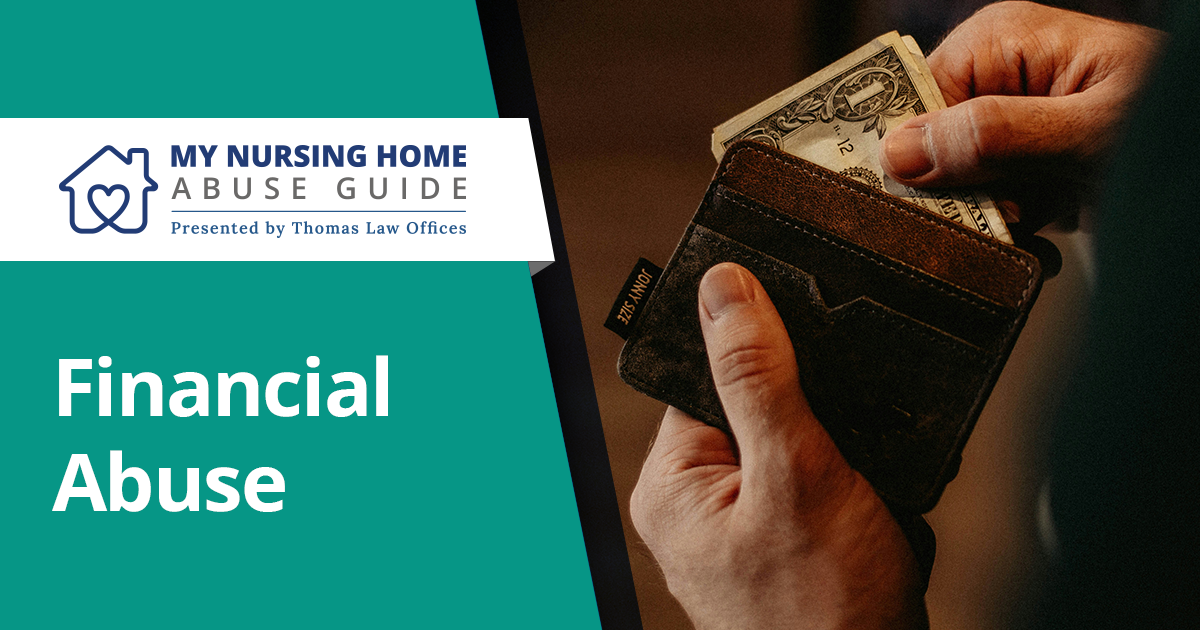Your Guide to Nursing Home Abuse & Prevention
Millions of elderly adults live in nursing home facilities.
Every one of them deserves to feel safe, protected, and respected.
Millions of elderly adults live in nursing home facilities.
Every one of them deserves to feel safe, protected, and respected.

Cases of physical abuse or emotional abuse are often at the forefront of many nursing home abuse reports. However, there is one type that not many people discuss but still brings significant consequences to those affected: financial abuse.
This type of abuse is a devastating type of crime. Usually, it involves the unauthorized, illegal, and improper use of the resident’s money, property, and assets. In many cases, it is not discovered until after the person’s death, leaving family members searching for answers.
While financial abuse does not leave physical scars, this type of abuse is the most destructive of all.
By using their role as a caregiver, fellow residents, or even family members, these perpetrators prey upon the most vulnerable and manipulate them for their own benefit.
A recent World Health Organization survey found that 1 in 6 older adults have suffered some type of abuse. Every year, 5% of seniors become the victim of financial fraud or exploitation, according to the United States Justice Department.
To make matters worse, many of these instances have been perpetrated by caregivers. In 2022, around 64% of long-term care staff report committing some type of abuse against residents.
Unfortunately, many of these cases go unreported.
This type of impropriety can occur in many ways. Often, the victims of this exploitation don’t know that someone has taken advantage of their assets or finances. Some of these crimes are simple acts of theft, while others look to exploit a person’s assets.
Here are some types of financial abuse that can happen to a nursing home resident:
Financial abuse of the elderly can take place in several ways. These crimes are often subtle and unnoticed until significant damage has been done. According to the National Adult Protective Services Association, some examples include:
One of the most common signs of financial abuse is unusual activity in a resident’s bank accounts. This could include:
These activities may indicate that a nursing home resident is being manipulated or coerced into making financial decisions that are not in their best interest.
Another sign of potential abuse is when an older person who has never used a debit or ATM card suddenly starts making ATM withdrawals. In these cases, someone else is using their card without their consent, or they are being forced to withdraw money against their will.
The creation of new powers of attorney that the older person does not understand can be a sign of financial abuse. This legal document gives someone else the authority to make decisions on behalf of the person who created it. If a resident is pressured into signing a power of attorney without understanding its implications, it could lead to financial losses.
These are just a few examples of how financial abuse can occur. Unfortunately, financial abuse can take many forms. Financial abuse is a crime, and it should be reported to the local enforcement authorities.
When fraud, theft, and other money-related crimes like the ones described above occur in nursing homes, they’re often perpetrated by those who are closest to the elderly. While family members can exploit a resident, many of these crimes are committed by staff members and caregivers within the facility.
They may steal cash or belongings from the individual, or convince them to sign over valuable property.
These individuals use their relationships to take financial advantage of residents. What’s concerning is that those who are supposed to be caring for and protecting the elderly are often the ones exploiting them.
If you suspect financial abuse, you should report your suspicions to the appropriate authorities, such as:
Financial abuse in nursing homes is a serious and widespread problem. You will want to be aware of the signs that this costly crime is occurring.
Find out how you can take action if you suspect that a nursing home resident is being exploited.
This website was created and is maintained by the legal team at Thomas Law Offices. Our attorneys are experienced in a wide variety of nursing home abuse and neglect cases and represent clients on a nationwide level. Call us or fill out the form to the right to tell us about your potential case. We will get back to you as quickly as possible.
866-351-2504